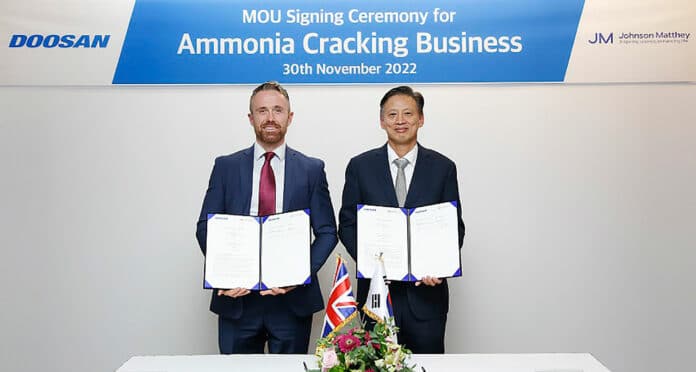South Korea’s plant builder Doosan Enerbility intends to obtain ammonia cracking technology, a technology applicable to the field of hydrogen-fueled power generation. This technology involves the process of generating hydrogen through the cracking of ammonia at high temperatures.
Doosan Enerbility announced that it had signed a memorandum of understanding (MOU) with Johnson Matthey (JM), a UK-based ammonia cracking solution provider, for cooperation in the ammonia cracking business.
As part of the partnership, Johnson Matthey will provide the ammonia cracking process engineering technology and catalysts, while Doosan will supply the technologies required in the implementation of projects, such as for the detailed design of the ammonia cracker process, manufacturing of equipment and the construction process.
In addition, the two companies plan to jointly develop engineering technology to integrate the ammonia cracking process and hydrogen-fueled combined cycle power generation so that they can apply it to hydrogen co-fired power generation in the future.
“Ammonia cracking, which is helping to lower the entry barrier to combined cycle hydrogen power generation, is a key technology that will contribute to the achievement of carbon neutrality,” said Hongook Park, CEO of Doosan Enerbility’s Power Services Business Group. He added, “This partnership signifies that the entire value chain for combined cycle hydrogen power generation will be built, meaning that the areas of hydrogen application, as well as hydrogen production, will be covered.”
Ammonia (NH3), a chemical compound composed of hydrogen and nitrogen, is regarded as being an economical “hydrogen carrier.” It has the capacity to store 1.7 times more hydrogen per unit volume compared to liquid hydrogen (LH2). Moreover, if the ammonia cracking technology is applied to combined cycle hydrogen power plants, the nitrogen that is generated from the ammonia cracking process has the advantage of providing improved hydrogen gas turbine performance, ultimately leading to enhanced energy efficiency.
